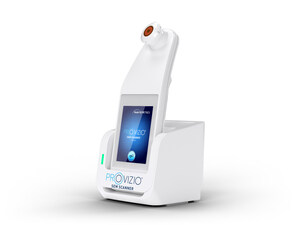Virgin Care Adopts BBI's SEM Scanner as New Standard of Care for Pressure Ulcer Prevention
Decision Follows Drastic Reduction in Pressure Ulcers at Hospitals Using the Scanner
LONDON and LOS ANGELES, Feb. 18, 2016 /PRNewswire/ -- Virgin Care, an independent provider of services to NHS England, today announced that it is equipping nurses with Bruin Biometrics' (BBI) SEM Scanner as its new standard of care for pressure ulcer detection and prevention, following a six-month pilot in which Virgin Care reduced pressure ulcers – a preventable patient safety issue costing the NHS over £2 billion per year – by approximately 95 percent, to nearly zero, with the SEM Scanner.
Virgin Care will initially deploy 10 of the hand-held scanners for detection of early-stage pressure ulcers in the first of a multi-phase initiative that could ultimately see as many as 100 scanners deployed to eliminate pressure ulcers in NHS community hospitals that Virgin Care leads in Surrey and across England.
"When the NHS' five-year strategic plan tasked all healthcare providers to 'get serious about prevention', we partnered with BBI, a developer of sensor-based diagnostics, to challenge the status quo and aggressively reduce pressure ulcer rates by using technology to identify skin damage earlier than currently possible," said Parker Moss, Virgin Care's Chief Technology and Transformation Officer.
The decision to broadly deploy the SEM Scanner follows a six-month pilot on two wards at Farnham Community Hospital in Surrey which demonstrated the clinical, health economic, and psychosocial impact of using the SEM Scanner alongside nursing care to improve patients' experiences and reduce valuable nursing time spent on diagnosis and treatment.
In the study, hospital-acquired pressure ulcers were reduced to nearly zero and pressure ulcers that are traditionally hard to detect were identified upon admission with the scanner, enabling clinicians to catch damage earlier and reverse it with timely and targeted care.
Virgin Care observed that using the SEM Scanner in combination with traditional standards of visual skin assessment led to more accurate patient diagnosis. As a result, unnecessary treatments for high-risk, but healthy patients, were avoided. Improvements in patient care and safety led to a boost in morale among nurses and nurse assistants using the scanner.
"These results were a combination of good nursing care and advanced technology," said Kirsty Thurlby, a nurse involved in the pilot programme. "The SEM Scanner, by providing evidence of early PU damage and engaging patients and their families, helps our hospital teams protect patients and their loved ones from the potentially life-threatening repercussions of pressure ulcers."
"The successful deployment of the SEM Scanner by Virgin Care and other NHS sites throughout the UK and Ireland is proof that this technology, focused on prevention, can deliver immediate patient benefit and more effective use of nursing care," said BBI CEO, Martin Burns. "Virgin Care is leading the charge in embracing innovative technologies."
The announcement comes one month after BBI was awarded with Frost & Sullivan's 2015 European New Product Innovation Award for the SEM Scanner, which was launched in the United Kingdom and Ireland after receiving CE Mark approval in 2014.
BBI recently closed a $9 million financing round to accelerate commercialization of the SEM Scanner, and is working with other NHS and Irish health system sites to achieve similar PU reductions and patient benefits. BBI will continue to invest in commercial infrastructure and clinical education programs to expand scanner usage throughout the region.
The company is working with FDA to make the SEM Scanner available in the US market in 2016.
About Pressure Ulcers
Pressure ulcers are a common medical problem that can lead to pain, disfigurement, infection and death. Also known as bedsores, pressure sores or decubitis ulcers, pressure ulcers are an area of localized damage to the skin and underlying tissue – usually around an area of bony prominence, such as the sacrum, coccyx, heels, and hips – that results from pressure involving shear and/or friction. Across Europe and the United States, it is estimated that 18%-25% of patients in both acute care and long-term care settings suffer from pressure ulcers, disproportionately impacting the elderly and patients with limited mobility. There are some 2.5 million pressure ulcer cases annually in the European Union, with nearly 500,000 of those cases in the United Kingdom: a £2.1bn problem equating to 4% of NHS spend. In the U.S., some 2.5 million Americans develop pressure ulcers annually in acute care facilities, and 60,000 Americans die annually from pressure ulcer complications such as cancer, sepsis, cellulitis, and MRSA. Approximately 80%-95% of cases are avoidable.
About Virgin Care
Virgin Care is an independent provider of NHS services, operating more than 230 frontline NHS and social care services across England. Services include community-based intermediate NHS services, GP-led walk-in and healthcare centres, urgent care centres, out of hours doctors services, community diagnostics and GP practices.
All of the services provided by Virgin Care are free at the point of use, just like any other NHS service.
About BBI
Bruin Biometrics, LLC ("BBI") is a medical device developer unique for its focus on sensor-based devices for monitoring and detecting chronic diseases earlier and with greater diagnostic certainty than currently accepted methods. The company's first product is the SEM Scanner, a hand-held non-invasive device that has been found to detect early-stage pressure ulcers as much as 10 days earlier than visual observation.
BBI is also developing OrthoSonos, a non-invasive device for real-time orthopedic joint monitoring and assessment of prosthetic implant failure; and P02M, the first device for monitoring tissue oxygenation at a specific location in real time. P02M is initially being tested for continual monitoring of tissue and vascular viability in the feet of diabetics. Diabetes can cause peripheral artery disease and peripheral neuropathy, putting patients at risk for foot ulcers.
BBI is based in Los Angeles and maintains a European office in Manchester, UK. For additional information, visit www.bruinbiometrics.com. Follow BBI on Twitter at https://twitter.com/bruinbiometrics.






Share this article